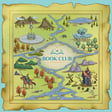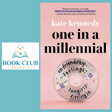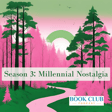Become a Creator today!Start creating today - Share your story with the world!
Start for free
00:00:00
00:00:01

Emergency Skin by N.K. Jemisin Book Club
This short story inspired a wide-ranging conversation about how Carly and Caroline respond to climate change in their personal lives. They talk about how they can build a better society right now but they choose not to because they are unwilling to make certain trade-offs.
Solar punk stories explore the potential for human society to respond to climate catastrophe to build a better society. In this story we have a picture of potential for a terrible society.
Get your copy of the books using our affiliate links here:
Seveneves by Neal Stephenson
Complete our feedback form and suggest books to read for future seasons: https://forms.gle/d1czC4kmE9gmzCes8
Subscribe to our email newsletter on Substack: https://bookclubpod.substack.com/
Transcript
Introduction and Spoiler Warning
00:00:00
Speaker
Hello listeners, this is your spoiler warning. We will be spoiling emergency skin and any other books we have read this season. But first, you must earn your piece.
Overview of 'Emergency Skin' and Earth's Transformation
00:00:24
Speaker
Welcome to the Book Club Podcast. Today we are discussing our short story for the season, Emergency Skin by N.K. Jemisin. I'm Carly, and I wish that this story gave more details about how the earth was healed, but I think we'll have more to talk about with the founders and their society.
00:00:44
Speaker
So I'm Caroline and I love how this short story just laid out that the best things in life don't or perhaps shouldn't have to be earned. So our summary, the story is told with the voice of an implanted AI speaking to you, a person bred on another planet living in a special suit called a composite. The ruling class called the founders left Earth some unspecified time before when the planet was dying.
00:01:10
Speaker
We learned that the ruling class on Yoo's home planet genetically engineer men eliminating the need for women. The lower classes must live in composite suits because they are not given skin to operate as independent organisms. The rulers can punish and even execute people living in composite suits if they disobey orders. The rulers send Yoo on a mission to collect cell cultures needed to prolong the founders' lives.
00:01:36
Speaker
promising you that he will get his own skin and not be enslaved by the composite anymore once he returns. Yu discovers that Earth is thriving. The people treat him gently and give him the cell cultures he needs for his mission. Instead of returning home, he activates his emergency skin so that he can appear as a regular human and stay on Earth. An old man takes him in.
00:01:58
Speaker
They go to a museum to learn how Earth was fixed after the founders left. Yu figures out that the old man was also from his home planet. He asks for help to bring the truth about Earth home. The story ends when the AI is
Themes of Autonomy and Control
00:02:12
Speaker
disabled. So the opening question is why skin? Right. Why skin? Why not some other piece of technology or
00:02:21
Speaker
you know, fake organ that makes people dependent on the rulers. Why skin? Or even, I mean, in Fifth Sacred Thing, water was how the underclass was controlled, access to water. And, you know, at that, you know, when we read that book, it's like, what is more essential than water? Well, this society has figured out how to make even skin. Yes. And to make it a part of a power play.
00:02:49
Speaker
Yeah, I mean, like a lot of these books that focus on such simple things, both just simple pleasures and just simple necessities like water and skin and food. It does make you really appreciate how important but also how wonderful our skin is. I mean, it's this amazing barrier, we can feel through it, but it protects us from
00:03:13
Speaker
disease and other sorts of injury, but it also grows and changes. I mean, skin is pretty amazing. You just never sit and think about it, right? Sure. And so, yeah, on a physical level, skin is amazing. But, you know, on the more like metaphorical level,
00:03:32
Speaker
it's our division between self and others as well. So like the way that the story is told, it's told from the perspective of an AI talking to you, which we kind of made that the name of the character. The character isn't named, it's just the AI talking to you. And the idea that there's a computer implanted within your mind, so you don't even have privacy in your mind.
00:03:58
Speaker
And in the other stories in the utopian societies, there was a high value placed on person to person connection and being joined together in that way. But here we have a picture of a dystopia. And first of all, it's not egalitarian, right? Like the AI gives orders from the founders basically to you and it's within you's own mind. So there's no like separation there.
00:04:24
Speaker
And you has no self, essentially. And I wonder how much skin is a representation of that. Yes, I agree with all that. It's also a representation of autonomy, right?
Class System and Technological Dependency
00:04:36
Speaker
Yeah. So I agree. Skin stands in for both connection and autonomy, both of which are denied to our narrator.
00:04:45
Speaker
It also, this premise that the founders have replaced something natural that is wonderful and effective, mostly, meaning our natural skin, with a piece of technology that then creates a dependency, was also an interesting thing to think about. When I read that, I thought, oh, there's a lot of analogies in modern life to that.
00:05:08
Speaker
But then when I started to think about it, I couldn't come up with such a clear example because most technologies are adopted for a reason, right? Even if they ultimately do create some unhelpful dependencies, right? It's all trade-offs. Right. Well, I mean, I think the fifth sacred thing is helpful again here to compare the idea of water and owning water. So currently our city controls the water and you pay the city to have water pumped to your house and
00:05:36
Speaker
With that, you get clean water, you get the pipes running all throughout the city into your home, but then you pay for it. And some folks, and maybe our San Franciscoans in the Fifth Sacred Thing would have a kind of visceral reaction to having to pay for water. But on the other hand, we eliminated cholera pretty much from American society. That seems pretty good.
00:06:01
Speaker
So in that sense, it's like, do we all have a right to water? And then this entity, the municipal water department takes control of that water. And in some places, you can't collect rainwater on your property. It's all very managed, right?
00:06:16
Speaker
Yeah. And so is there a qualitative difference between that and then managing skin? I feel like I'm kind of defending the founders. The founders have a heinous society. They have a very clear aristocratic class who are essentially immortal is my impression because
00:06:34
Speaker
U is sent to Earth to collect biological samples that would help prolong their lives. And then there are other classes that are kind of mentioned. Our narrator U is in the military class and then there are servant classes that are mentioned.
00:06:51
Speaker
And for this mission to Earth, you was promised skin and is promised to be elevated into that higher status. And then by the end of the story, we're thinking that's probably not going to happen. Like, even if you successfully completed the mission, probably they would just kill him and, you know,
00:07:11
Speaker
send someone else. So it's a society that I don't want to be part of. It's a heinous society. But I do have to wonder if the founders didn't start out that way, right? Like the intense pressure of having to survive, fleeing Earth that they believe is dying, and on a planet that is not as hospitable to human life, they had to develop ways to survive. And those ways to survive ended up developing technology that then allowed them to create this class system.
00:07:40
Speaker
where only the aristocratic class actually has autonomous bodies with skin. So I'm a little skeptical of that interpretation because I think there are a couple of statements in the short story where it's clear the founders were a problem before they left. I mean, you know, they existed in earth society. So obviously they hadn't created a society, you know, the details of the society they have now, but there's some suggestion that they were equally greedy and hierarchical. Like I think at one point she says,
00:08:10
Speaker
Actually, the AI says this, that in the last decades on Earth before leaving, the founders had amassed enough resources to be able to fund their flight to another planet, with the implication to me that they had been greedy and had taken far more resources than was fair, at a time when everyone else was suffering.
Earth's Recovery and Societal Change
00:08:31
Speaker
I think there's a good suggestion that the founders were part of the problem on Earth, and then they took those same racist, sexist, classist ideas to their new planet and maybe elaborated on them further. But it seemed like they were not good from the beginning.
00:08:46
Speaker
Sure. No, I can buy that. I wasn't thinking that they were fully virtuous people. I was thinking that there was a seed of the racist and classist that then was exacerbated because of the need for survival and the way they develop technology for survival. So yeah, I don't want to argue that they were blameless.
00:09:04
Speaker
I mean, they had a certain culture, certain value system that then gets expressed after, I don't know how many years. It feels like hundreds of years of existing on this other planet to develop this society. So then it's a very different split from Earth, the people remaining on Earth somehow. And as I said before, I was a bit frustrated at the sort of lack of detail.
00:09:28
Speaker
but they somehow just worked together to eliminate borders and heal the earth because the founders left. Yes, and that is clearly stated that once those people were gone, the rest of us could flourish, both because their beliefs were toxic and then I think also implied because they had been hoarding resources, essentially. Right. But I think your point about the struggle for survival on this exoplanet
00:09:56
Speaker
really brings up an important point, which is, does a struggle for survival make people better or worse?
00:10:03
Speaker
Yeah, that gets us to the idea for potential. We've talked about a cataclysm forcing societies to change. And that change can be for the better, as in most of the stories we've read so far. And this story, we get the perspective of a society where their potential has been reached in a way that does not seem better, it seems worse. Yeah, I mean, there's definitely a thread in Solarpunk, is this idea that people will respond
00:10:33
Speaker
differently now to a climate catastrophe than they have in the past, all the historical examples of people under states of deprivation, like siege, warfare, starvation. There are some heroes, but there are also many villains in that sort of situation. And Solarpunk seems to think that this would be different. Somehow people would respond to this emergency, some people, better, right? Yeah.
00:11:00
Speaker
So why would a climate catastrophe be different?
00:11:04
Speaker
Right. Well, so I mean, we have different cultures and it does mention that there were other groups of people who left Earth at that time. But then when they received news that the Earth had recovered, they came back. And so it seems like there were other groups of people with a value system that allowed them to come back. Like the founders would never come back to Earth because that would mean giving up their classes society. Right. That they're at the top of. So.
00:11:30
Speaker
Right. But there are other people. So it depends on the culture of the people who is forming the society. So the people remaining on Earth, this is where I get the most skeptical of that. The people left on Earth all suddenly had a culture of community and working together and erasing borders. There is I mean, I agree. That is not
00:11:53
Speaker
well described, certainly not thoroughly described. There's a couple sentences or two where she implies that once everyone's basic needs were taken care of, and once everyone could get an education, then because there were now billions of educated people who had the mental time and energy available to devote to technology if they wanted, then there was this flourishing of technology that solved problems.
00:12:20
Speaker
So to the extent that people would respond to climate catastrophe different, I think it's because of two things. One, it's not factional, right? It's not person against person, it's person against nature. But then more importantly, perhaps we're at a time in history where even in the face of a climate catastrophe, we could provide enough basic resources for everyone that then we would have everyone's mental and emotional resources to respond to the catastrophe.
Fear, Resource Allocation, and Societal Reactions
00:12:51
Speaker
So the answer is what's different about this catastrophe is we just have a baseline level of strength that we can provide for all people and therefore we can all tackle this together. Yeah. I mean, I like the idea. I wasn't given enough in this story. Unlike some of the other stories, this story, we get a much better description of the dystopian society.
00:13:10
Speaker
people will become better in the face of a climate catastrophe, but also people can become worse. So we have the founders as an example who become worse and that offering an education to everyone on earth is what allowed them to sort of solve the problems and heal the earth.
00:13:26
Speaker
Do you want to talk more about fear? So we can imagine that the people on earth had quite a lot of fear about the earth dying, right? So they didn't let that fear turn them into the founders. What is it about the culture that reacts to fear differently? Is it education? I don't understand how if the planet is dying, how is everyone getting fed? That's what I don't understand. I mean, I agree in general, but I also think
00:13:55
Speaker
We as a society spend so many resources on unnecessary things that food could be provided if there was the will. Like food, basic housing, some sort of communication system. Those are just a fraction of the resources we expend on other very unnecessary items. So that part doesn't bother me as much, but the question of fear is a really good one. Because there's fear both of the catastrophe, fear that
00:14:24
Speaker
You know, you're going to die. You're going to be one of the people that is taken out by the natural disaster or your family members. There's also fear about change. And everyone in this society would have been dealing with those same fears, right?
00:14:38
Speaker
Well, and we have the founders as an example of why we should fear change because they changed society and it turned out pretty bad for most of the people in that society, it seems. Yeah. I mean, we talk a lot very casually in this podcast about what is essentially a mass revolution in culture and government and economy and everything. And in the books we read, take a very optimistic approach on that. We wanted that. That's why we read them.
00:15:07
Speaker
But almost every dystopia starts out with the premise that people thought this revolution would be for the best, right? Yeah, I do think and this is not really in the book at all. This is just my speculation. I wonder if people in power have a different additional sort of fear.
00:15:26
Speaker
when it comes to change and maybe they're struggling to distinguish between fear for their survival versus fear for survival of life as they know it with all of their privileges intact. And to the person, you know, experiencing it, those probably do seem like the same fear. I'm going to suggest they're not the same fear.
00:15:43
Speaker
Yeah, well, I don't know that our just like our limbic system can differentiate, right? Well, you said a second ago, how do you learn to deal with the fears of education? And that's what's needed something that can
00:15:58
Speaker
tell the limbic brain like here break it down here's you know it's reasonable to be afraid of the death of your loved ones but it's not so reasonable to be afraid that you know your lifestyle might have to change and you end up walking over or you know maybe you have to live in denser housing like is that really worth being afraid of uh but that's a huge project i mean we're talking about rewiring people and their fundamental fears about the world right
Lifestyle Choices and Societal Ideals
00:16:27
Speaker
Sure. Well, and I think you and I share the same preferences for having a lot of personal space and solitary time. And in the books, in the utopian version, people do get a lot less alone time. They share a lot more and they're with people a lot more and connecting a lot more. And that feels very demanding. And I myself am reacting to that as like, oh, no, I don't want that. I like my own space.
00:16:57
Speaker
But the question is, would that fear or distaste stop you from, you know, if it was up to you, we can have this civilizational change towards utopia, but you know, you personally are going to have to give up some private space, some alone time, and also probably most of your possessions. If it's stated that bluntly, right, how could you choose anything other than the new civilization? But the problem is getting it to be stated that bluntly, right?
00:17:23
Speaker
No, I have and do every day make that decision. I have had the opportunity to go live in intentional communities, but I would have to give up a lot of financial security. I'd have to give up my dogs. I'd have to give up my space. I'd have to give up the knowledge that I can be in the same place a month from now that I am now.
00:17:44
Speaker
I've had that process, that thought process. It's very real to me that every single day I choose to stay in a house by myself with my dogs and my books. And instead of going to live, the life that fully represents my ideals, right? And it's not about a catastrophe. There's nothing stopping me from doing that right now, except me. It's my choice. And I'm choosing not to do that.
00:18:11
Speaker
I mean, is it a cop-out to say this is a little different because we're not talking about a society-wide change? We're talking about being a small community that's trying to exist with these ideals in the face of a culture that doesn't have it. I mean, it just seems inherently more unstable and risky.
00:18:29
Speaker
Sure. But is it more risky or less risky? Because you can always fall back on our current worldwide supply chain if your community farm fails. That's less risky. That's true. Yeah. And the people who form these communities are doing it to show that culture can shift and show that there's a way of life that's different. We don't need to count on a cataclysm
00:18:55
Speaker
We can make change more slowly and less drastically and less risky. So if we want that future for society, there's like there's nothing stopping any of us from from doing that right now. Yeah. OK, so now this is really starting to sting, right? Like, oh, we're not just talking about books now. When are we only talking about books? I know. Yeah, true.
00:19:19
Speaker
Yeah, I mean, that thought stings, right? Like it's one thing to imagine a future society, but what am I doing now? What would I actually give up right this moment? I'll leave the question open. I don't have an answer.
00:19:32
Speaker
Well, and to make it sting even more, it's these daily decisions made by individuals that perpetuate the system that leads to climate collapse, right?
Climate Change: Personal vs Industrial Responsibility
00:19:46
Speaker
True. Although I will push back a little bit because I think the waste that goes on, you know, in an ordinary household is just nothing compared to industrial waste and the waste
00:20:01
Speaker
that businesses produce. I still think there's a moral quality to trying to prevent waste as just one example. I don't know how willing I am to feel guilty
00:20:11
Speaker
for the overall climate catastrophe. There's a lot of that. I don't want to try and make you feel guilty. That is not my goal. Because these are the questions that I struggle with. Yeah, I do too. I mean, if we're being honest, and I hate this thought, but every time I throw away something plastic, I think about the great Pacific garbage heap, whatever it is. And that's a heavy thought for
00:20:34
Speaker
something pretty minor and I reduce plastic use and we have replaceable stuff in the house and all that. But is the degree of emotional distress proportional since I've already made the decision to reduce as much as possible? Is this kind of a waste of my own mental resources to feel guilty about something even if I've made the changes that I'm willing to make? I need to keep going down this path and changing more and more all the time.
00:20:59
Speaker
Right. Do we need to push on our institutions to make greater change? Yeah, that would be the more effective change, right? You should do both, like reduce personal waste, but it's not just personal consumption patterns. It's changing the way our institutions do things, the way they respond.
00:21:18
Speaker
changing the way we interact with other people too. We mentioned in a song for the wild build, I remember the monk went to the abandoned monastery in the wilderness and noticed the attempt to have a more sustainable building materials and sustainable structure and sustainable way of life. And there was a moment of noticing there were people before the cataclysm who were trying to live this way, but it wasn't enough. It took the cataclysm.
00:21:46
Speaker
That fills me with fear, too. I don't want a cataclysm. You know, I want a nice, gentle, a gentle shift into a new way of life. Yes, agreed.
Post-Pandemic Societal Speculation
00:22:00
Speaker
And I have to say, we had a cataclysm. We had a global pandemic. Do we see major changes? I think it's too early to tell, but but I'm looking for them like, yeah. Well, that was a particularly difficult
00:22:15
Speaker
Cataclysm. I mean, I guess they all catastrophes are difficult. Sure. But for what we're talking about here about social more is changing. That was particularly difficult because it was so isolating. I would like to see a reaction to that isolation in in more value like we see in the books about of human connection and strong social bonds. I agree. And you know, but I know that in myself, my own response to that was mixed.
00:22:42
Speaker
So on the one hand, it made me appreciate the importance of living near the people you love and of having strong ties in your immediate, you know, walkable community. On the other hand, I did get used to being home a lot and it's a hard habit to break. So like you said, it's too soon to know there's mixed, mixed responses. Uh, but the overall question of how do people change after
00:23:08
Speaker
a catastrophe. It's really an open one. Let's return back to the story a bit. The connections aren't made for us as readers in the story. Why when you can make skin a commodity, why then the offer of skin is very closely defined in a specific beauty standard?
00:23:27
Speaker
you know, blonde, Grecian nose, you know, that's, that's like the very first few paragraphs of the stories. Like you will have the skin and you will be this beautiful and it's white and blonde and male. And the AI makes some really disturbing comments about humans on earth being female or having darker skin or being disabled or fat or old. That was hard. That was hard for me to read, honestly. Like I struggled.
00:23:57
Speaker
Just to loop back to the opening quote, that's the origin of the opening quote. The AI says to the narrator, you will earn your beauty, meaning once you've performed enough tasks for us, then we'll give you this type of skin and you'll be beautiful. So sorry, was there a question? Yeah, I don't see the logical connection of you have,
00:24:22
Speaker
You're in a world where you're growing humans and vats. Why would that trend towards, OK, since you're genetically engineering everyone, why genetically engineer everyone the same?
00:24:35
Speaker
And why this standard of beauty? I mean, is it strictly coming from the founder's values before they left Earth?
Beauty Standards and Societal Status
00:24:42
Speaker
Maybe that, maybe it still has some value to say that even, because they've made having skin itself a status item, right? But then even within that, there's different status levels to having skin and hair and body shape. And so it's just like endless fractals of status, right? And maybe that's useful to those in power, obviously.
00:25:04
Speaker
I mean, that's not really in the book, I don't think, but there's a lot that isn't. Right. Well, I mean, do you think that there's a reasoning for why like white and blonde, or that's just like what the founders valued before they left Earth? I mean, it's probably meant to show that they took
00:25:22
Speaker
some of Earth's racist values with them, I think, because there's no reason for it. They even say at some point that darker skin is more efficient from a sunburner perspective, which is interesting because other places they're talking about, well, our society is always about the most efficient
00:25:41
Speaker
productive decisions. Well, white skin is not that if you're worried about radiation, right? Yes, but if you're on a planet where you're living in a structure because your planet is hostile to human life and you don't need to see the sun ever, I could see beauty standards evolving naturally based on the environment, right? I mean, we see beauty standards evolving within every decade of
00:26:05
Speaker
So why wouldn't they evolve further? I don't know. I don't know if there's a I don't understand the connection there of life. There is a reason. I think the point is that it's unreasonable.
00:26:17
Speaker
I mean, that's true for a lot of status objects, right? They are valuable precisely because they are not useful. Right. And status feels very artificial. And the world that the founders have built, it's so artificial. There's no room for a diverse environment that you're reacting to and responding to and adapting to. It has to be very constructive.
Nature's Role in Human Enjoyment
00:26:40
Speaker
Yes. In contrast with the
00:26:43
Speaker
civilization on earth, which we don't hear a ton about, but it's clear that, you know, there are wild forests. He walks through one. They are using a lot of eco-friendly materials. Their cities are beautiful. He describes them as beautiful, but not disorderly, but abundant in a way.
00:27:02
Speaker
nature, natural, right? Which the AI responds to some reactions like you becomes very excited at seeing the woods and like seeing the beautiful sunrise and it is like your heart is racing, you're in danger. And it's like, no, you're not, you're not stressed, you're excited. And I wonder about pleasure, like so much about pleasure is
00:27:27
Speaker
a surprise, I feel like. And, you know, enjoying something that is delightful that you couldn't have imagined how delightful it was until you experienced it, basically. And that feels true of like looking at different kinds of people. And then, of course, romance and sex. And when you seize a woman for the first time, it's explained again, very disturbing. I don't want to talk about it.
00:27:52
Speaker
Like women were basically eliminated because in the exoplanet society. Yeah, right. Like they don't need to procreate through sex. And so women have been eliminated and seen as useless, which I don't know. Do you want to talk about like what is pleasure? What is enjoyment? There's I mean, I love what you just said about there's an element of surprise in pleasure always.
00:28:17
Speaker
because that also means it can't be controlled, sometimes by the person experiencing it, but also from the outside. And it makes me think, I've always felt there's such a feeling of freedom in appreciating the small things. This morning, I was looking at my backyard, which is like, small and, you know, there's patches where the grass is worn down and then it
00:28:40
Speaker
the fence is just like this faded cedar fence and you know like it's not winning a best award but there's trees overhead that are in full leaf because it's been wet there was wind the sun was shining through it and so everything was just shifting and moving all the time and it was really beautiful and i enjoyed it but i also felt this sensation of pride in enjoying it because that's mine like this moment is mine uh not even the fact that it's my backyard i would feel that way in the park but like
00:29:10
Speaker
Nobody can take this from me, that I can stop and enjoy this. Yeah. I mean, that's something that it seems like in every single book we've read, there's been a moment where a character has taken a breath, enjoyed the feeling of sunlight on their skin. And even in this story where you've actually gets emergency skin and feels the sun on it and the breeze, that's happened in every single Solarpunk book we've read. So I think you've identified what is that?
00:29:39
Speaker
There's something really punk about enjoying nature and enjoying the simple things in general, actually. So I don't know if I've said this before. It's one of my favorite quotes. I think about it a lot. Not really a quote. So Diogenes, ancient Greek philosopher, is sitting eating lentils.
Simple Pleasures and Conscious Living
00:30:00
Speaker
Yes, I've probably said this before. And someone in the town who is
00:30:04
Speaker
You know, one of the elite very close to the king has lots of status says something to him along the lines of, you know, Diogenes, if you're nice to the king, he'll give you much better food. You don't have to eat lentils. And Diogenes says, but if I like lentils, I don't have to be nice to the king. Okay, I thought you're going to tell a different story about Diogenes. But I love that story. I don't think I've heard that one. Actually, if you like lentils, you don't have to be nice to the king.
00:30:30
Speaker
Yeah, no, that's so true. The story I remember about Diogenes that I've heard told many times is that Diogenes was sitting on the ground eating, it wasn't specified lentils, and Alexander the Great comes up to him and says, you're so wise, I will give you anything you want. And Diogenes says, could you stand aside? You're in my light. Yeah, you're blocking the sun. You're blocking the sun.
00:30:56
Speaker
Very similar stories, right? Yes. No, but I like yours. The idea of like, if you yeah, to get back to your point, if you enjoy the little things, those cannot be taken away from you. But then also you cannot be coerced or enslaved for what you want, because you want things that cannot be taken from you. I also like it because to some extent you can control what you enjoy, or at least you can prevent your tastes from becoming
00:31:25
Speaker
too specific and elaborate. I don't think you just flip a switch one day and you're like, you know what, I like lentils if you've never liked them before. But you can have more of them and try some new recipes and grow to appreciate them in a variety of ways. You can shape your tastes to be less dependent, for lack of a better word.
00:31:47
Speaker
Right. Well, I think you can find more enjoyment in the fact that it's about trade-offs again without sacrificing something else that is also valuable to you. I mean, I'm just thinking about the zucchini that I'm growing. And I don't know if it's going to be tasty. It probably won't be as tasty as a zucchini I could get at the store. But it's exciting that I grew it. And I've been watching this plant grow for many, many months. And I finally have a zucchini that's big enough to eat.
00:32:11
Speaker
The enjoyment of that part of it goes into how much I enjoy actually eating the zucchini and it's not just the flavor. I think that's really interesting when we think about our modern society and what is available for purchase. I live within walking distance of a very well-known
00:32:32
Speaker
restaurants, very expensive restaurants. But having to work a job to pay the money to afford a very expensive restaurant experience means that my life would have to shift in a way that I'm unwilling to shift. I would much rather work the job I have and grow my own zucchini and like, you know, simply eat that. Although I will say I did splurge on some very expensive olive oil and fancy vinegar. So there is that. I don't know.
00:33:02
Speaker
I mean, none of us are saints. I decided to splurge on the oil and vinegar because then I can make a better meal at home for a lot less money than going to one of these really nice restaurants. That's the trade off. I think these are the sort of differences in learning to enjoy different things that make me very hopeful.
00:33:27
Speaker
Like it's great to buy new clothes, but yesterday I actually mended something. I mended a dress that had been torn, like not well. Like if an archeologist ever looked at this dress, they'd be like, I can tell this wasn't her day job. She's not an expert in this, but it was so satisfying. And every time I look at the dress now, I feel this completely absurd, disproportionate sense of achievement, but that was free. It was actually,
00:33:55
Speaker
the opposite of wasteful and it feels good right so that's part of what i like about solar punk is imagine different ways of living become sensitized to what would be enjoyable in those ways and then you seek them out and your tastes change.
00:34:10
Speaker
Right. We talked earlier a bit about guilt and shame for not living up to these ideals. But there's another side of that, which is just training yourself to enjoy different things. And how easy is that? Right. That reminds me of Ecotopia. The comparison of a journalist had a girlfriend who was very sophisticated and kept up with the fashion trends. And then his love for
00:34:34
Speaker
Marissa, the Ecotopian, who didn't wear makeup, worked a very physical job and spoke her mind and didn't care about what other people thought, basically, except her family. And that seemed to have been illustrated very clearly in Ecotopia, this shifting of tastes and what you find desirable. Yeah. He also in that book talks a lot about how their clothing doesn't have any synthetic dyes. So it's not very bright, but it's
00:34:59
Speaker
creative in other ways because people have the time and the skills to do their own sewing and make it reflective of their true personalities. So it's just a shift. They had fashion, but of a different kind. Well, we've kind of already been talking about these genre themes. I think it's really interesting that this very short story has given us so much to add context to the stories we've already read. Yes. Yeah, I agree.
Integration of Technology and Nature in Solarpunk
00:35:24
Speaker
I think one theme that I wanted to talk about that we touched on a little bit was the beauty and importance of natural things. And it's very clear in this book, natural skin is obviously superior to the composite skin.
00:35:37
Speaker
But I want to point out that one thing I like about this genre is that it doesn't go full in on the natural is better paradigm, because we get plenty of that in other types of genres. And I think there's a real strain of that in American society. And in general, like looking, quote unquote, back, there was never a time like this, but this idea that anything natural is superior or
00:35:59
Speaker
you know, if we all lived, quote unquote, a more primitive lifestyle, then we wouldn't have stomach problems or modern diseases or anything like those ideas are out there. And Solarpunk does not go down that road. Solarpunk appreciates the beauty of nature, but also the things that can be provided by technology. It's both together, right? It's not just humans trying to be animals and live in a state of nature, whatever that means. It's
00:36:24
Speaker
appreciating the wonderful things we're given from nature and then also using technology to improve the things that weren't great or that we need to flourish as humans. So I just want to point that out that this book really made me think about that distinction and that common error that solar punk doesn't make.
00:36:42
Speaker
Yeah, I didn't catch it the first time I read the story, but you lands in Raleigh, North Carolina, and observes that the city, it should have been underwater due to rising sea levels, but it wasn't, and that the city structures were elevated.
00:37:00
Speaker
The AI makes a comment of, it looks like plastic, but it's not. It's a cellulose. It's derived from plants. Yu is not able to take a sample with his tools. His tools are not able to cut into this material. So yeah, I think it's very clear that they have used technology to create a new way of living. They haven't just reverted back to a past version of Earth. They've created a new way of living that is more aligned with the ecosystem.
00:37:28
Speaker
Yeah, another Solarpunk theme that we've seen again and again is that many of the most valuable things are free and natural, like a sunset, physical sensation, sex, human connection.
Skepticism and Optimism in Resource Provision
00:37:41
Speaker
and things that can be provided to everyone. I'm skeptical of this, but I'm, you know, Solarpunk is slowly winning me over, but I'm mostly skeptical of the idea that everyone can be provided with housing, food, education, and autonomy. Autonomy, I agree with, but those other things, a little bit skeptical. I don't know what we would have to do to answer that question in a practical way. Can everyone on this planet be provided with housing, food, education, and autonomy?
00:38:07
Speaker
I don't know how to answer that. It seems true to me. So much is wasted, and it takes relatively little to provide those things. But anyway, I guess answering that specific question of whether or not it's possible or practical is not the goal of this podcast, not exactly. Right. Right. Earning personhood. In the dystopian societies that have been shown to us, there's the concept of earning personhood. Now, in the dispossessed,
00:38:33
Speaker
Which is funny, like the whole, the title of the dispossessed, which we didn't talk about is kind of about, it seems to be illustrating this idea of people who don't have status or what they need or, or even autonomy. But was there a path for earning personhood in the dispossessed? I don't, I don't know. Maybe we should save that for our wrap up episode. I don't think it was as clear in that one as in some of the others.
00:38:58
Speaker
I do think it is inherent in any society that says the necessities will be distributed according to who earns them, right? So does it really make sense to say someone deserves housing more than another? I don't think so. But if you do say that, I think you're saying at heart someone is worth more than another. Oh, that's rough.
00:39:19
Speaker
But I mean, this book certainly explicitly talks about earning personhood, earning the right to have a skin, to be autonomous, to have beauty, all of that. The founder society treats that as something that must be earned.
00:39:35
Speaker
To me, it seems very, very clear that even if you did completed the mission and returned back home, that you was not going to get personhood. Like, is that the sense you got from the story? Oh, I don't think they were genuine in their offer at all, which is another layer to it, right? But even if it had been genuine, why should someone have to earn something so fundamental?
00:39:58
Speaker
Right. No. And I think I think what the question like it brings up the idea, like if someone is telling you you have to earn personhood, then there's no value in that system at all.
Reflecting on Solarpunk's Vision and Listener Engagement
00:40:08
Speaker
Like you're not going to earn personhood even if they're telling you that that's what. And they're probably lying because their power comes from denying.
00:40:15
Speaker
those sorts of things. So they're not going to hand it out easily and maybe not at all. They're just going to pretend that if you work hard enough, you can get it. Right. Yeah. It's an endless like carrot on a stick that you're never going to get. Yeah. And we talked a little bit about the superiority. Yeah. Yeah. Superior in some ways, you know, human skin, pretty amazing. Sunsets, pretty amazing.
00:40:38
Speaker
but not in others. I need contacts to see, and I'm glad I have them, right? Yeah. And Solarpunk, I think, really combines those two. Yeah. I really like that. It's a more nuanced way of looking at the way humans fit within the world, the way that... Yeah. You could even say it's natural for humans to create technological solutions. Yeah. Yes. Final thoughts? I, for one, am going to think more about
00:41:07
Speaker
learning to like lentils more, but specifically about just enjoying simple things, you know, how powerful that is, how much that's in my control. You know, it's one thing to feel guilt and use that as a way to change behaviors and that can be effective, but we can also just talk about choosing new enjoyments, new pleasures. So I'm going to think about that. I'm going to feel really great every time I see that dress that I hemmed.
00:41:37
Speaker
Yeah, I'm going to think about the parts of the story that irked me, you know, the whole sort of glossing over of how the earth came together to heal. I'm going to think about why that I have such a hard time giving the benefit of the doubt to that part of the story. Other books you've read have won me over and helped me get rid of skepticism, but it's still there. I still have a lot of skepticism about this optimistic view of humanity.
00:42:02
Speaker
I hate saying that. It's not like I'm pessimistic about humanity. I just don't know that this is the way I think. It's a big ask, right? It's a big vision in all of these books about how humanity is going to change thoroughly and quickly. I mean, it's a big vision. Listeners, what did you think of Emergency Skin by N.K. Jemisin? Have you read any other books by N.K. Jemisin? What do you think about solar pumps?
00:42:28
Speaker
Let us know by recording a voice memo and emailing openingquestion at gmail.com.
00:42:33
Speaker
You can also comment on our sub stack at bookclubpod.substack.com. If you're enjoying our book discussions, please leave a review in your podcast staff. Our next discussion will be about Seven Eves by Neal Stephenson, one of my favorite authors. I'm very excited about this. Read with us and start reading now because it's a long book. We'll release that episode in two weeks and you can get your copy by using the affiliate link in our show notes.
00:43:02
Speaker
The book club podcast is produced by me Carly Jackson and Caroline Gorman music and audio editing by Alex Marcus. Thanks for listening









